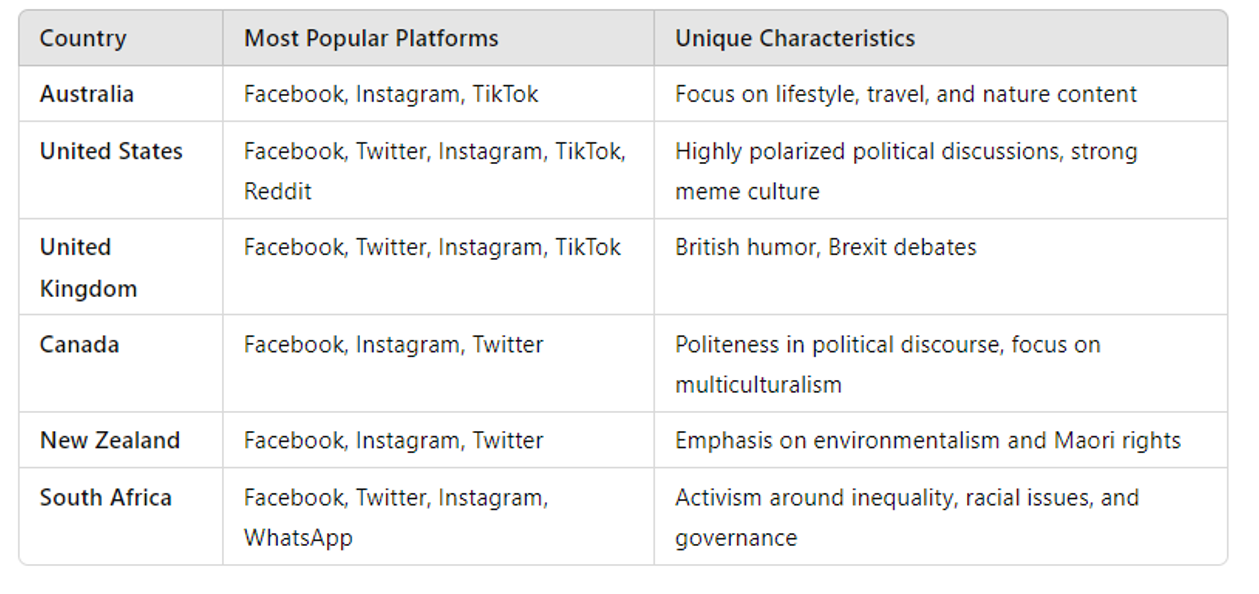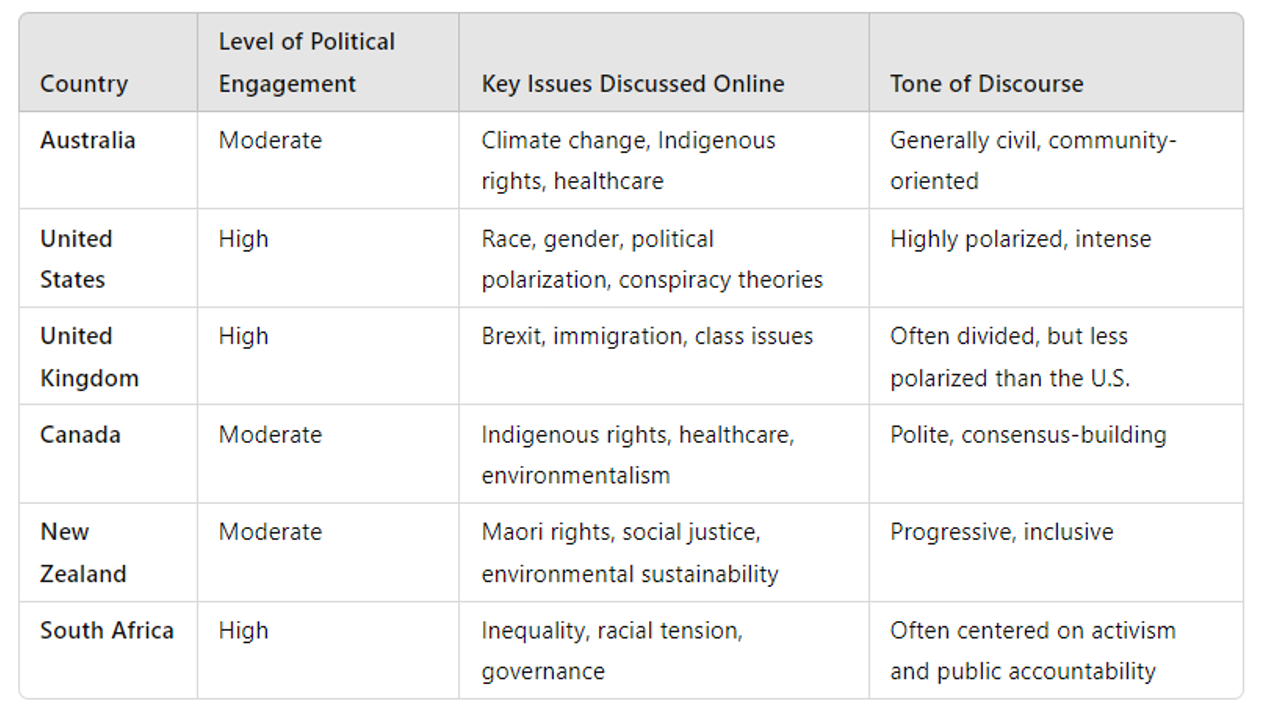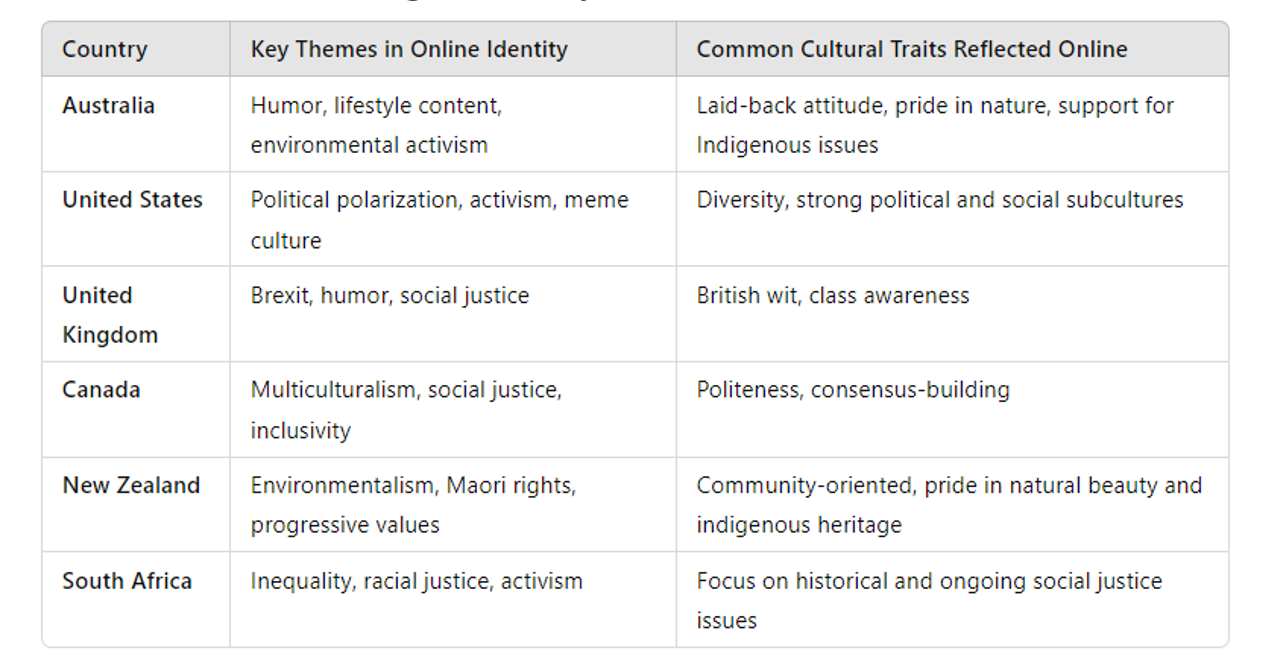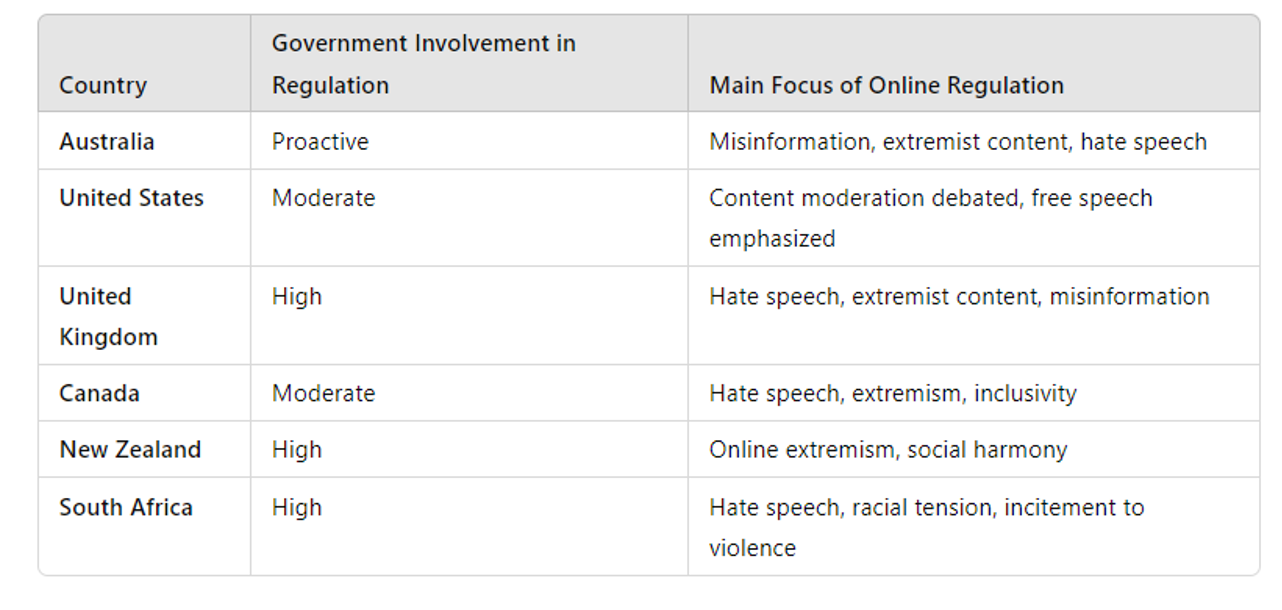A Digital Ethnographic Comparison: Australia and other English-speaking countries
Digital ethnography involves studying cultures and communities through the lens of their online behaviours, communication styles, and the digital platforms they use. By comparing Australia with other primarily English-speaking countries (such as the United States, Canada, the United Kingdom, New Zealand, and to a lesser extent, South Africa), we can analyse various dimensions of digital culture: social media usage, online discourse, digital political participation, and more.
Here’s a comparative analysis of these countries:
Social Media Usage and Platform Preferences
Australia’s online behaviour is centred around lifestyle and travel, leveraging its natural beauty and laid-back culture. The U.S., on the other hand, reflects a digital sphere driven by political polarisation and meme culture. The UK’s online activity combines British humour with strong political debates, while Canada prioritises politeness and multicultural values. New Zealand’s digital identity leans into environmentalism and the rights of its indigenous Maori population, and South Africa’s online presence is shaped by its ongoing battles with inequality and racial issues.

Digital Political Participation
Political engagement is moderate in Australia, where issues such as climate change, Indigenous rights, and healthcare are discussed civilly. In contrast, the U.S. has high levels of political participation, often marked by extreme polarisation and intense online debates. The UK sees robust political debates, especially surrounding Brexit and immigration, while maintaining a slightly less divided tone than the U.S. Canada’s discussions emphasise indigenous rights and environmentalism with a more polite tone, and New Zealand focuses on progressive issues like Maori rights and sustainability. South Africa’s digital political sphere is highly activist, centred on issues of racial tension and inequality.

Online Discourse and Digital Identity
In terms of digital identity, Australia’s laid-back lifestyle and strong focus on nature are reflected in its humorous, community-oriented discourse. The U.S. is known for its highly diverse, polarized online communities, with distinct political subcultures clashing regularly. The UK’s online identity is infused with dry humor and a sharp focus on social justice and class issues. Canada’s digital identity emphasizes inclusivity and multiculturalism, while New Zealand’s highlights progressive values and pride in Maori culture. South Africa’s online presence reflects its historical and ongoing struggles with inequality and racial tensions.

Digital Censorship and Regulation
Regulation of digital content varies across these countries. Australia and New Zealand both take a proactive approach to regulating harmful content, including misinformation and hate speech, with New Zealand implementing strict laws in the wake of the Christchurch mosque shootings. In the U.S., free speech protections make government regulation more limited, though content moderation on private platforms is widely debated. The UK and Canada balance regulation with the need for inclusivity, focusing on hate speech and extremism, while South Africa’s regulatory framework addresses issues of racial tension and violence in its online spaces.

Strengths, Weaknesses, and Opportunities for Each Country
Australia
– Strengths: Strong community engagement, emphasis on lifestyle and nature, relatively civil political discourse.
– Weaknesses: Limited political participation compared to the U.S. and UK.
– Opportunities: Leverage digital spaces for environmental activism and Indigenous rights advocacy, fostering stronger political movements.
United States
– Strengths: High digital engagement, diverse online subcultures, strong political activism.
– Weaknesses: Extreme polarization, toxic political discourse.
– Opportunities: Enhance digital literacy to reduce misinformation and promote more constructive online discussions.
United Kingdom
– Strengths: Active online political discussions, rich humor, strong awareness of social justice issues.
– Weaknesses: Ongoing political division, especially around Brexit.
– Opportunities: Use digital platforms to bridge post-Brexit divides and foster national unity.
Canada
– Strengths: Civil discourse, focus on inclusivity, environmentalism, and indigenous rights.
– Weaknesses: Lower online political engagement compared to the U.S.
– Opportunities: Promote digital activism in key areas like environmental sustainability and indigenous rights, engaging more Canadians in the process.
New Zealand
– Strengths: Progressive values, strong community focus, emphasis on environmental and indigenous issues.
– Weaknesses: Small online footprint globally due to population size.
– Opportunities: Expand digital activism and international visibility around environmental and Maori rights, leveraging its progressive reputation.
South Africa
– Strengths: Strong digital activism around racial and social justice issues.
– Weaknesses: Online spaces often marked by tension and division due to historical and ongoing inequalities.
– Opportunities: Foster greater digital engagement in political accountability, anti-corruption efforts, and community-building through online platforms.
While Australia shares several digital behaviours with other English-speaking nations, its online culture is distinctly shaped by its laid-back, nature-oriented ethos and its focus on community issues like Indigenous rights. The U.S., by contrast, is a landscape of polarized debates and highly active political movements, while the UK balances humor with intense political discourse. Canada remains a beacon of civility and multiculturalism online, New Zealand emphasizes progressive values and environmentalism, and South Africa’s digital sphere reflects its ongoing challenges with racial and social justice issues.
Each country’s digital identity offers unique strengths, but there are also opportunities for growth, particularly in fostering more inclusive and constructive online spaces that address both national and global challenges.




